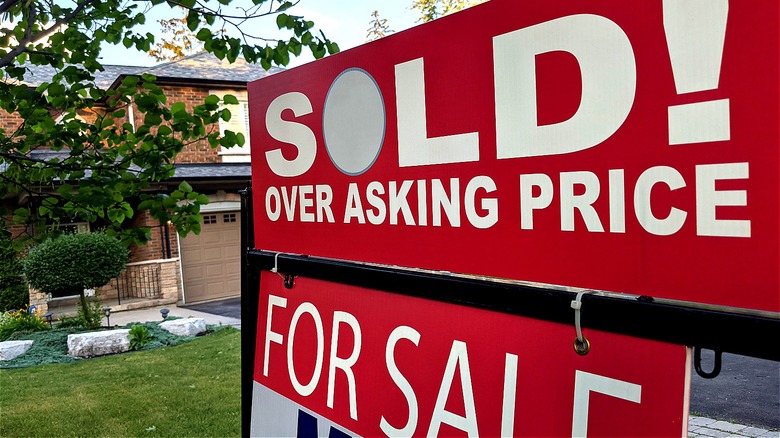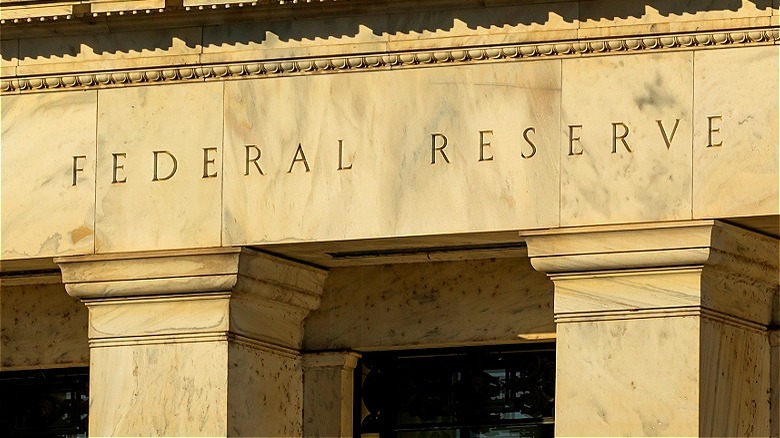What Actually Controls The Price Of Homes?
Since the pandemic-fueled spike in home prices pushed many would-be homebuyers to their financial limits, there's been a lot of discussion over what, exactly, controls home prices nationwide. Current interest rates (thanks to this Federal Reserve committee's attempts to curb inflation) have similarly strained or even stalled potential homebuyers as they face higher mortgage payments and overall loan amounts (the average 30-year mortgage rate as of mid-May 2024 was 7.09%). This increasingly complicates the question of whether renting or buying is the better long-term financial option for Americans. While Zillow listings might have you questioning your sanity, it can be important to look at the factors that are ultimately impacting the home prices in your area.
The basic principle of supply and demand is ultimately at the core of most price changes within the United States real estate market today. Yet, there are significant factors that can (and do) influence that housing demand across the country. As this demand fluctuates, prices change, even if the prices hit levels most people can't afford. For instance, according to data from the Federal Reserve of St. Louis, the median home sale price nationwide for the first quarter of 2024 was $420,800, compared to $329,000 in the first quarter of 2020, representing an almost 28% increase in home prices, despite modest wage increases that have not kept up with the higher expense of U.S. housing. Let's now dive into some of the key factors that could be impacting the housing market supply and demand in your area.
Market demographics
A significant factor to consider about the housing market and what determines home prices is the demographics of those participating in the market at a given time. A good example today would be the mass retirement of baby boomers, also known as the silver tsunami. The retirement trend of such a large age demographic is bound to impact the housing market in major ways. First off, as boomers potentially downgrade, sell, or even die out of their larger homes, it could create an increased supply of larger homes that would enable younger families to move. This, in turn, could lead to a domino effect in which smaller "starter" homes in an area open up, as families are able to upgrade to these newly available larger homes. However, increasingly, boomers are unwilling to leave their homes, which has contributed to a shortage of larger homes.
On the flip side, with the increase in home prices (as well as interest rates), newly available larger homes might not ultimately be financially affordable for younger families. It's also worth mentioning that, as family sizes in the U.S. continue to shrink, a preference for larger properties might become a thing of the past. Depending on when larger boomer-owned homes might enter the market, sellers could end up having to bring prices down due to affordability concerns for potential buyers. Another potential housing market change as a result of this large-scale retirement trend is that it could create increased demand for second or even vacation homes, especially in the more popular tourist areas. This could lead to increased competition and higher prices in hot markets.
Housing and economic policies
While we previously mentioned interest rates (in particular, how high rates are), they're just one factor that can impact housing prices (not to mention things like the best time of year to sell a home). While high interest rates can make it especially difficult for prospective homebuyers, there are many other housing policies that can similarly make the process less accessible. Legislation at the federal, state, or county and city levels can have a huge impact on your overall demand and, therefore, your overall housing prices. From available tax credits to deductions to subsidies, government legislation can help to incentivize homeownership in a specific area. This demand boost can increase housing prices, however, it might only be in a temporary way, so keeping track of any available incentives can help you as both a buyer or seller.
Connected to policies is also the general state of the economy. Inflation, employment, and even consumer spending can all impact the overall economy which, in turn, affects the housing market. Generally speaking, a slow or sluggish economy will be similarly reflected in the real estate market. Depending on the current state of things, different policies could be enacted or changed as a way to speed up or slow down economic growth (interest rates are a great example of this). The accessibility of borrowing money through either higher or lower interest rates, combined with inventory levels (aka, demand compared to an area's supply) can all factor into whether the real estate market is currently in a buyer's or a seller's market.


